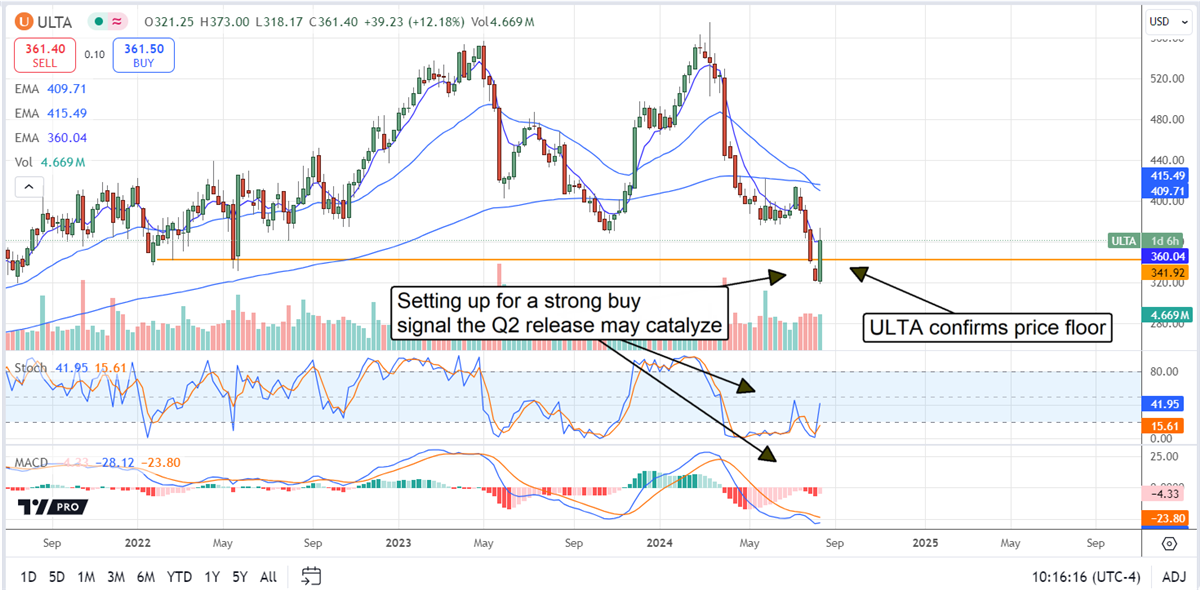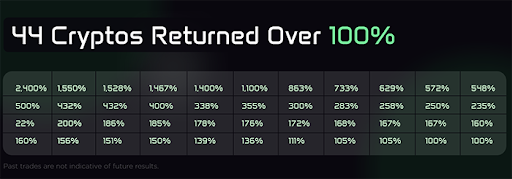Ticker Reports for August 15th
Michael Burry's Alibaba Bet and the Broader Market Implications
Michael Burry, the founder of Scion Asset Management and renowned for his visionary bet against the housing market in 2008, continues to captivate the investment community with his unconventional strategies. His latest portfolio disclosures, revealed in the recent 13F filing for the second quarter of 2024, have sparked considerable interest, particularly his significant increase in Alibaba Group Holding Ltd (NYSE: BABA) shares and a substantial reduction in his overall portfolio size. How does this strategic maneuver impact the broader market, and what does his strategy reveal about his convictions regarding the stock market's future?
The 13F Filing: A Window into Institutional Investment Strategies
Before diving into the specifics of Burry's strategic portfolio adjustment, it's essential to understand the context of the 13F filing. This quarterly report, mandated by the Securities and Exchange Commission (SEC), provides a snapshot of the equity holdings of institutional investment managers with over $100 million in assets under management. While offering valuable insights into the investment strategies of prominent figures like Burry, it's crucial to remember that 13F filings have limitations. They are backward-looking, reflecting holdings at the end of the reporting period, and therefore may not accurately represent current positions. Additionally, they do not disclose short positions or holdings in non-US equities.
Alibaba: The Cornerstone of Burry's Concentrated Portfolio
Burry's most notable move in the second quarter was a significant increase in his Alibaba stake. Scion Asset Management now holds 155,000 shares of the Chinese e-commerce giant, valued at approximately $11.16 million, making it the largest holding in the portfolio. This move suggests a bullish outlook on Alibaba's future prospects, potentially driven by several factors. The Chinese regulatory landscape, while still evolving, has shown signs of easing, potentially creating a more favorable environment for tech companies like Alibaba. Furthermore, the company's strong market position in e-commerce, cloud computing, and digital entertainment, coupled with its massive user base, positions it for continued growth in the long term.
Alibaba's Strategic Diversification: Navigating New Opportunities
Beyond Alibaba, Burry's portfolio reveals a strategic allocation across diverse sectors. Notable additions include Shift4 Payments Inc (NYSE: FOUR), a leading provider of integrated payment processing solutions, and Molina Healthcare Inc (NYSE: MOH), a Fortune 500 company offering managed healthcare services.
These investments, valued at $7.34 million and $7.29 million, respectively, suggest a focus on companies with solid fundamentals and potential for growth in their respective industries. Burry also initiated a position in Hudson Pacific Properties Inc (NYSE: HPP), a real estate investment trust specializing in office and studio properties, further diversifying his portfolio across asset classes.
Portfolio Pruning: Burry's Focus on Strategic Reductions
While adding new positions, Burry also significantly reduced his overall portfolio size, exiting several holdings entirely and trimming others. Notable exits include Citigroup Inc (NYSE: C), a multinational investment bank, and HCA Healthcare Inc (NYSE: HCA), a leading operator of healthcare facilities. These moves, coupled with reductions in holdings like JD.com Inc (NASDAQ: JD) and The RealReal Inc (NASDAQ: REAL), suggest a strategic reallocation of capital and a more concentrated approach to investing. This downsizing could reflect a cautious outlook on particular sectors or a belief that specific companies no longer align with his investment thesis.
Burry's Focus on Alibaba: A Bet on China's Tech Future
Michael Burry's recent portfolio adjustments offer valuable insights for investors seeking to navigate the complexities of the stock market. His focus on Alibaba suggests a belief in the long-term potential of the Chinese tech sector. At the same time, his strategic diversification highlights the importance of allocating capital across different industries and asset classes. Furthermore, his willingness to exit positions and reduce holdings underscores the need for continuous evaluation and adaptation in response to changing market dynamics.
By analyzing Burry's actions, investors can gain valuable lessons about the importance of in-depth research, understanding market trends, and developing a well-defined investment strategy. While his contrarian approach may not be suitable for everyone, his willingness to challenge conventional wisdom and make bold moves serves as a reminder that success in the market often requires a willingness to think differently and adapt to changing circumstances.
Michael Burry's recent portfolio adjustments provide a fascinating glimpse into the mind of a seasoned investor. His increased stake in Alibaba, strategic diversification, and portfolio downsizing reflect a carefully calculated approach to navigating the current market landscape. While the future remains uncertain, Burry's actions offer valuable lessons for investors of all levels, emphasizing the importance of research, adaptability, and a well-defined investment strategy. As the market continues to evolve, staying informed about the decisions of prominent investors like Michael Burry can provide valuable insights and contribute to informed investment decisions.
Former Hedge Fund Manager Issues Crash Prediction
Our No. 1 stock for the rare "millionaire window" opening NOW
According to Wall Street legend Whitney Tilson, an extremely rare window in the markets is about to open. It's an often-misunderstood market setup we've only seen 13 times since 1920. The last time this happened, it minted a million brand-new millionaires – in a single year. But Tilson says this unique window in the markets could close much sooner than anyone realizes, leaving most investors in the dust, while making a select few incredibly rich.
Jeff Brown's Exegesis AI Stock Picks
The artificial intelligence (AI) sector is experiencing rapid growth and innovation, with companies like NVIDIA experiencing unprecedented stock surges. This AI frenzy has generated significant wealth for many investors and fueled concerns about overvaluation and potential bubbles reminiscent of the dot-com era. However, Brownstone Research founder and chief investment analyst Jeff Brown believes that a series of developing technologies poised to redefine the industry lie beneath the surface of this current AI boom. Known as Exegesis AI, this series of new technologies will define the coming second AI revolution in the artificial intelligence sector.
Defining Exegesis AI: A Paradigm Shift in Artificial Intelligence
Exegesis AI represents a paradigm shift from the current generation of AI, often called "Narrow AI." While existing AI models like ChatGPT excel in specific tasks like language processing and automation, they can only think independently and solve complex problems with human intervention. Exegesis AI, conversely, promises to overcome these limitations, offering a more advanced form of artificial general intelligence (AGI).
The term "Exegesis" derives from the Greek word "exegeomai," meaning "to lead out of" or "to explain." This etymology reflects the core functionality of Exegesis AI. Jeff Brown believes this new technology promises to extract more profound meaning and understanding from complex data, leading to novel solutions and insights. Unlike current AI models that rely on pre-programmed responses and training data, Exegesis AI is designed to learn, adapt, and solve problems autonomously, mimicking the human brain's cognitive processes.
Unveiling the Transformative Applications of Exegesis AI
Brownstone Research believes that Exegesis AI's potential applications span a wide range of industries, promising to revolutionize everything from energy production to healthcare and robotics. One of the most promising applications lies in the clean energy sector, where Exegesis AI could be the key to unlocking the secrets of nuclear fusion, providing humanity with a virtually limitless source of clean energy and addressing the growing concerns about climate change.
In the healthcare sector, Exegesis AI could accelerate drug discovery and development, leading to more effective treatments for a wide range of diseases. By analyzing vast amounts of medical data and identifying patterns that elude human researchers, Exegesis AI could pave the way for personalized medicine and improved patient outcomes.
Furthermore, Exegesis AI is expected to drive significant advancements in robotics, enabling the creation of fully autonomous humanoid robots capable of performing complex tasks in various environments. These robots could revolutionize manufacturing, logistics, and healthcare industries, increasing efficiency and productivity while freeing humans from repetitive and dangerous tasks.
The Race for Supremacy: Big Tech's Investment in Exegesis AI
Recognizing the transformative potential of Exegesis AI, major tech companies like Google, Microsoft, and Amazon are investing billions of dollars in "AI factories." An AI factory is a massive data center designed to train and develop this next-generation technology. This race for supremacy in the Exegesis AI landscape is fueled by the understanding that the winners will control technology with the potential to generate trillions of dollars in value.
The rapid advancements in AI, as evidenced by the exponential growth in AI processing power, suggest that Exegesis AI could arrive sooner than anticipated. Analysts from Brownstone Research, including founder Jeff Brown, predict that this new era of AI could emerge as early as 2026, highlighting the urgency for investors to position themselves strategically in this rapidly evolving market.
Investing in the Future: Identifying Promising Exegesis AI Stocks
While large-cap AI stocks like NVIDIA have garnered significant attention, the potential for growth in the Exegesis AI market lies within smaller-cap companies developing the underlying technologies and infrastructure. Brownstone Research is a leading authority on AI investment opportunities and has identified a select group of promising small-cap stocks poised to benefit from the Exegesis AI revolution.
Brownstone Research has a proven track record of identifying successful tech investments. Past stock picks have generated returns ranging from 500% to 20,000%. Their expertise in the AI sector positions them as a valuable resource for investors seeking to capitalize on the emergence of Exegesis AI.
Brownstone Research's model portfolio of five small-cap companies focuses on those developing critical technologies for the Exegesis AI ecosystem, including data center infrastructure, advanced AI chips, and AI-powered software solutions. These companies are strategically positioned to benefit from the anticipated surge in demand for Exegesis AI-related technologies and services.
The August 28th Catalyst: A Potential Turning Point for Exegesis AI
While the details remain undisclosed, Brownstone Research has identified August 28th, 2024, as a potential catalyst for the Exegesis AI market. This date could mark a significant turning point in developing and adopting this groundbreaking technology, potentially impacting companies' valuations in the Exegesis AI ecosystem.
Embracing the Transformative Potential of Exegesis AI
Exegesis AI represents a paradigm shift in the artificial intelligence landscape, promising to unlock unprecedented potential across various industries. Investors seeking to capitalize on this transformative technology should focus on smaller-cap companies developing the underlying technologies and infrastructure to power the Exegesis AI revolution. Brownstone Research's model portfolio offers a valuable resource for identifying promising investment opportunities in this rapidly evolving market. By understanding the transformative potential of Exegesis AI and strategically positioning their investments, investors can participate in shaping the future of artificial intelligence and potentially reap significant financial rewards.
Exposed: 3 CENT Crypto to Explode August 19th?
Chris Rowe – the man who recommended Amazon in 1998… Bitcoin and Ethereum in 2017…
And has spotted 44 different coins that have returned over 100%...
Today, he is now making the biggest crypto call of his ENTIRE career…
Warren Buffett's Bet: Why Berkshire Hathaway Bought Ulta Stock
Warren Buffett and Berkshire Hathaway (NYSE: BRK.A) filed their quarterly 13-F, sending ripples through equity markets from Apple (NASDAQ: AAPL) to Ulta Beauty (NASDAQ: ULTA). The takeaway from the filing is that Berkshire continues whittling down its position in Apple and other tech plays and is taking a side in the beauty wars. The beauty wars are a battle between newer, hipper brands such as Ulta and e.l.f. Beauty (NYSE: ELF) is against the legacy cosmetics companies that are losing. The legacy companies are still far larger but are slowly losing market share, while Ulta and e.l.f. gain it, driving value for their shareholders.
Why would Buffett choose Ulta? The value compared to cash flow, profitability, and balance sheet. Highlights from Q1 include solid margin with the gross at 40%, operating near 17%, and net at 11.5%. The balance sheet details included a slight reduction in cash offset by increased inventory, current and total assets, virtually no debt, and a 15% increase in shareholder equity. The cash flow and balance sheet allow for share repurchases, another factor likely driving Mr. Buffett’s interest, reducing the average count by 4%. Management forecasts these trends to continue and improve.
Berkshire Hathaway Buys 1.4% Stake in Ulta Beauty
Berkshire Hathaway purchased 690,000 shares at an average price near $385. The lot size is worth about 1.4% of the share outstanding, which isn’t much but significant because of the entry point. The $385 target aligns with the bottom of a two-year trading range and a price floor indicated by the analysts. Analysts' activity in 2024 is bearish at face value, resulting in ULTA’s placement on MarketBeat’s list of Most Downgraded Stocks. Still, the critical details not only support this market but suggest a robust rebound is due.
The analysts have trimmed their targets but remain steadfast in believing this stock is buyable. The twenty-three tracked by MarketBeat have it pegged at a Moderate Buy and see it advancing more than 50% at the consensus midpoint. The consensus is down from its peak, and a new low target of $325 was recently set, but the $325 low is an outlier; eight or 80% of the revisions issued since the Q1 release are in the range of $400 to $544 and 50% are at $500 or higher, suggesting a move to consensus is probable. A move above the consensus is possible.
Coincidentally, the institutional activity in 2024 is also bullish. The institutions have bought on balance for the YTD period, with most of the activity in Q1 and Q3. That activity aligns with the 2024 price action, which is moving within a range, with Berkshire confirming the bottom.
Ulta Reports Earnings on August 29th: What to Watch For
Ulta Beauty is scheduled to report earnings on August 29th and will likely provide a bullish catalyst for the market. The analysts have only lowered their estimates since the last report, setting the bar very low and expecting a seasonal sequential downtick in revenue compounded by a weakening margin. Results from e.l.f., which relies heavily on the Ulta Beauty retail channel, grew at a high double-digit pace when adjusted for acquisitions, grew market share, and maintained margin.
The price action in Ulta is bullish. The market is up 10% on the Berkshire acquisition news and confirms the bottom of the range at $340. Support at $340 appears to be strong, with volume rising to a multi-quarter high. There is some resistance to the move; the price action moves lower after gapping up at the opening but is above the critical resistance point, the 30-day EMA. Assuming support remains firm at that level, shares of Ulta are likely to continue higher, as indicated by MACD and stochastic. The MACD and stochastic oscillators show a Strong Buy signal and a high probability the rebound will continue and may even strengthen.







0 Response to "🌟 Warren Buffett’s Bet: Why Berkshire Hathaway Bought Ulta Stock"
Post a Comment